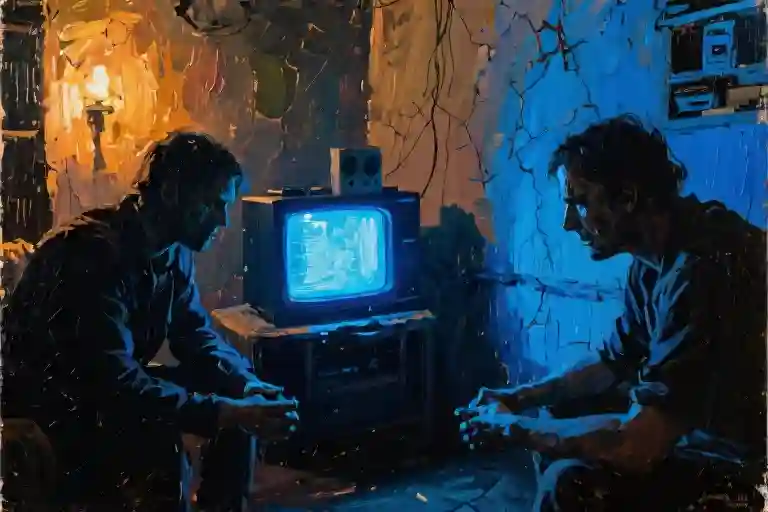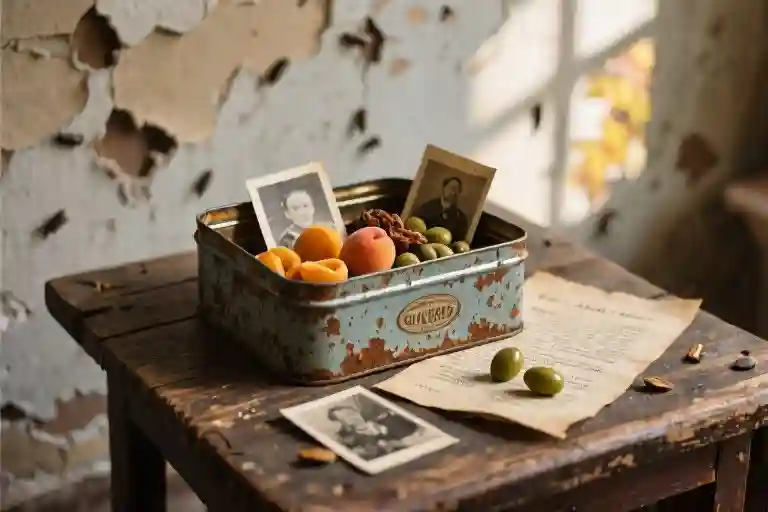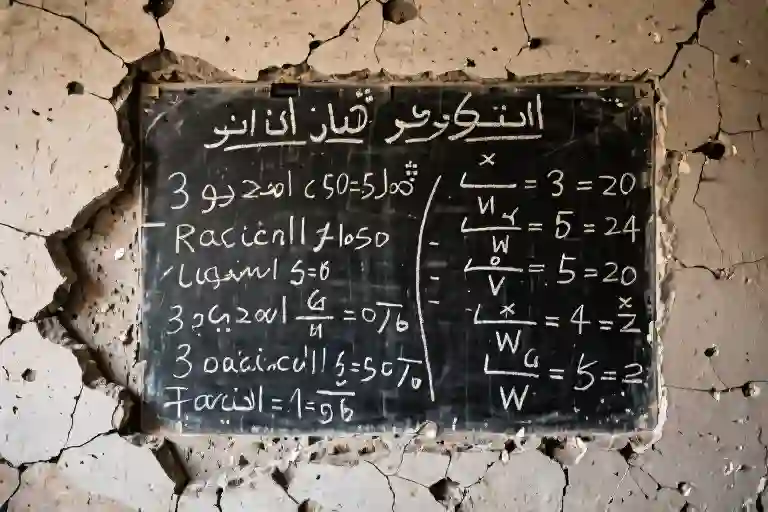The blue glow from the television screen flickered across nine exhausted faces in the dark room. This wasn’t our first shelter, but we knew with quiet certainty it would be our last. The phone screen showed 9:37 PM on January 15, its battery icon hovering at 62% – a number we’d all learned to monitor as religiously as the news ticker now scrolling across the TV.
My youngest brother knelt by the car battery we’d spent the morning charging, adjusting the TV antenna with a screwdriver his teacher had left behind during the third displacement. The aluminum rod caught fragments of light from the screen, casting jagged shadows that reminded me of missile trails we’d seen too often. From the northeast, the distant thud of artillery arrived exactly three seconds after the news anchor’s lips moved – a delay we’d grown accustomed to measuring.
Mother’s hand suddenly pressed down on my wrist. ‘Listen,’ she whispered. The room froze. ‘The announcer… his speech pattern changed.’ We leaned toward the grainy broadcast, our collective breath held somewhere between hope and dread. The battery-powered television had become our fragile tether to a world beyond these walls, its signals as unreliable as the ceasefire rumors that had taunted us for fourteen months.
On the floor between us, nine smartphones lay in a semicircle like some strange digital shrine, each screen periodically lighting up with push notifications from different news apps. My sister’s phone displayed a live map of Gaza with blinking red dots I didn’t want to understand. My uncle kept refreshing a diplomatic feed, his thumb moving in the same rhythm he’d once used to flip through prayer beads during quieter times.
The room smelled of sweat and the sharp citrus of the last remaining disinfectant wipes. Someone – probably my nephew – had scratched tally marks into the wall behind the TV, though whether they counted days or airstrikes or ration portions, none of us could remember anymore. What remained clear was the unspoken agreement: when the battery dropped below 30%, we’d switch to radio mode to conserve power. For now, we watched the scrolling text at the bottom of the screen like ancient priests deciphering omens.
From the kitchen corner where our makeshift charging station hummed, the power bank emitted its periodic beep – a sound that had replaced birdsong as the background noise of our lives. My father sat closest to it, his shoulders hunched in a way that made him look older than his fifty-three years. He kept glancing at mother’s face, searching for cues in the way her fingers tightened around her teacup each time the news ticker hesitated.
We’d perfected this silent communication through twelve displacements. The language of raised eyebrows and half-swallowed sighs. The vocabulary of survival that required no translation. Outside, the wind rattled what remained of the building’s broken windows, carrying with it the metallic scent of recent rain mixed with something darker, something that clung to the back of your throat.
The television flickered again, and for a moment I saw our reflections in the darkened screen – not as we were now, but as we’d been before the first displacement. Before the photo albums got left behind. Before we learned to distinguish between different types of explosions by sound. Before ‘home’ became any four walls that might stand intact through the night.
The Anatomy of Waiting
The screwdriver in my brother’s hand trembled slightly as he adjusted the TV antenna for the third time that hour. Its metal tip caught the dim light from our last functioning battery, casting jagged shadows across the ceiling that mirrored the cracks in our plaster walls. We’d become experts at finding the sweet spot – that precise angle where Al Jazeera’s broadcast came through with minimal static, usually achieved when the antenna leaned just left of the water stain near the window.
Three seconds. That was the constant delay between the news ticker scrolling across our flickering screen and the actual explosions rumbling from the northeast. We’d developed an unconscious habit of counting those seconds, our bodies tensing in the pause between visible words and audible impacts. The dissonance made everything feel unreal, like watching a badly dubbed foreign film about someone else’s war.
Mother’s hand shot out suddenly, her fingers pressing against my forearm hard enough to leave marks. ‘Listen,’ she whispered, though no one had been speaking. ‘The anchor – his cadence changed.’ We all leaned forward as one, nine pairs of eyes tracking the rapid Arabic script at the bottom of the screen. The usual measured tones of the newsreader had indeed accelerated, his vowels clipping short in that particular way that preceded major announcements.
My youngest cousin began rocking slightly, her knees drawn up to her chest. No one told her to stop. The battery indicator on our makeshift power source blinked from 47% to 46%, each percentage point ticking down louder than the last in the silent room. Someone’s phone buzzed against the concrete floor – probably another forwarded message from the neighbor downstairs who still had patchy cellular data. We’d stopped checking these rumors hours ago, choosing instead to fixate on the official broadcast, as if staring hard enough could make the words materialize faster.
Outside, the usual nighttime sounds of Gaza had taken on a strange quality. Fewer generators humming, more dogs barking at nothing. Even the distant artillery seemed to be holding its breath, the intervals between shelling growing longer and more irregular. The air smelled of damp concrete and the last of our mint leaves, which Auntie had been crushing between her fingers to stay calm.
My brother adjusted the antenna again. The screwdriver slipped this time, leaving a fresh scratch on the windowsill to join the collection of marks documenting our stay. We didn’t mention how this particular scar would outlast us in this room, just as the pencil lines on the doorframe of our first home still marked the heights we’d grown to before the displacements began.
The Archaeology of Displacement
The first time we fled, my mother clutched the family photo album against her chest like a shield. Its faux leather cover grew damp with sweat as we ran through backstreets, the weight of memories measured in grams. By the third displacement, the album had shed half its contents – wedding portraits left in a hurry, school certificates abandoned when the backpack grew too heavy. What remained were not the happiest photos, but the lightest ones: a birthday Polaroid, my brother’s kindergarten drawing on tracing paper.
During the seventh displacement, we learned to measure survival in milliliters. My sister’s asthma spray became currency when we reached the overcrowded UN school. The metallic hiss of its last doses traded for two bottles of water that tasted of plastic and dust. That was when father stopped being the decision-maker and became the weight calculator, his fingers constantly moving as he subtracted grams from our collective burden.
The twelfth escape happened in rain so thick it blurred the missile trails. Our suitcase – the last stubborn holdout from normal life – caught in the crater’s mud like an anchor. For three minutes we pulled, until the handle came away in my grip. We left it standing upright, wheels half-submerged, like some modern art piece about interrupted journeys. That night, mother sewed our IDs into the hems of our jackets while humming a lullaby she’d forgotten the words to.
These weren’t migrations but forced moltings. Each relocation shed another layer of what made us a family with history, until we became just bodies moving through space. The album’s remaining photos curled at the edges from too many pockets, their colors fading like our sense of continuity. Yet when the TV signal failed that last night, it was those damaged images we passed around in the dark – not to remember, but to prove to ourselves we’d once been people who took photographs at all.
The Language of Silence
The rhythm of my father’s prayer beads matched last Ramadan’s exactly—thirty-four clicks between each breath, the same hesitation before the ninety-ninth bead. This consistency in chaos felt like the only intact artifact from our old life. The plastic beads had survived twelve displacements, though the thread had been replaced twice with dental floss from aid packages.
In the corner, my sister kept tally marks on the wall. Not of shellings or airstrikes, but of words spoken. That day we’d exchanged exactly forty-seven: seventeen about the ceasefire rumors, twenty-three coordinating food distribution, seven miscellaneous. Our family that used to argue about football teams now rationed syllables like water.
When the power bank emitted its final warning beep, nine pairs of eyes snapped toward our mother’s lips. She hadn’t spoken since morning, when she’d divided the last pack of biscuits using the cardboard as a ruler. Now her dry lips parted slightly—not to speak, but to moisten the chapped skin with what little saliva remained. The unasked questions hung between us: Would she bless the next dangerous journey? Curse the politicians? Recite the prayer for travelers?
The television’s glow died first, then the router’s green lights. In the sudden dark, the absence of artillery noise became louder than explosions. My youngest brother’s knee pressed against mine, not seeking comfort but confirming presence. We’d developed this tactile language over months—pressure for ‘I’m here,’ two taps for ‘danger,’ prolonged contact for ‘don’t sleep.’
Someone’s stomach growled. No one apologized. The sound joined the symphony of our survival: the rustle of UNHCR blankets, the scrape of a spoon against an empty can, the metallic whisper of my father restarting his prayer count from the beginning. These were the dialects of our displacement, more eloquent than any ceasefire announcement could ever be.
The Last Wait
The blue glow from the television flickered across nine faces in the dark room, each expression suspended between exhaustion and something that wasn’t quite hope. We’d learned to measure time differently during these fourteen months of displacement – not by calendar dates but by the remaining percentage on our power bank. Sixty-two percent tonight. Enough to last through the announcements, maybe.
When the 404 error pages lit up simultaneously on all our phones, it felt like the room itself had exhaled. Not a sigh of disappointment exactly, more the quiet recognition of a pattern we’d come to know too well. The television antenna made that sharp cracking sound as it finally gave way, its metal spine broken from too many adjustments toward signals that never stayed consistent.
‘Are we waiting for the thirteenth displacement now?’ my youngest sister asked. Her voice didn’t tremble. That surprised me most of all – how normal the question sounded, as if she were asking about homework or bedtime. We’d all gotten too good at this.
Outside, the distant thuds continued at irregular intervals. Someone’s phone caught a fragment of news headline before losing connection again. Ceasefire. Maybe. Possibly. The words dissolved into pixelated fragments before we could grasp them. My brother kept twisting the broken antenna base out of habit, his fingers moving automatically like they had during all those nights of keeping the signal alive just a little longer.
Mother counted her prayer beads in the corner, the rhythm identical to last Ramadan when we still had a front door to hang the lanterns on. I watched her lips form silent words that might have been prayers or grocery lists or both. After twelve relocations, sacred and mundane had bled together until you couldn’t separate hunger from hope, faith from fatigue.
The power bank emitted its final warning beep. In the sudden darkness, we didn’t reach for candles. Just sat there breathing in unison, waiting to learn whether the next breath would belong to peace or another midnight escape. The unasked question hovered thicker than dust motes in the air: When does a temporary shelter stop being temporary and become the only home you remember?



